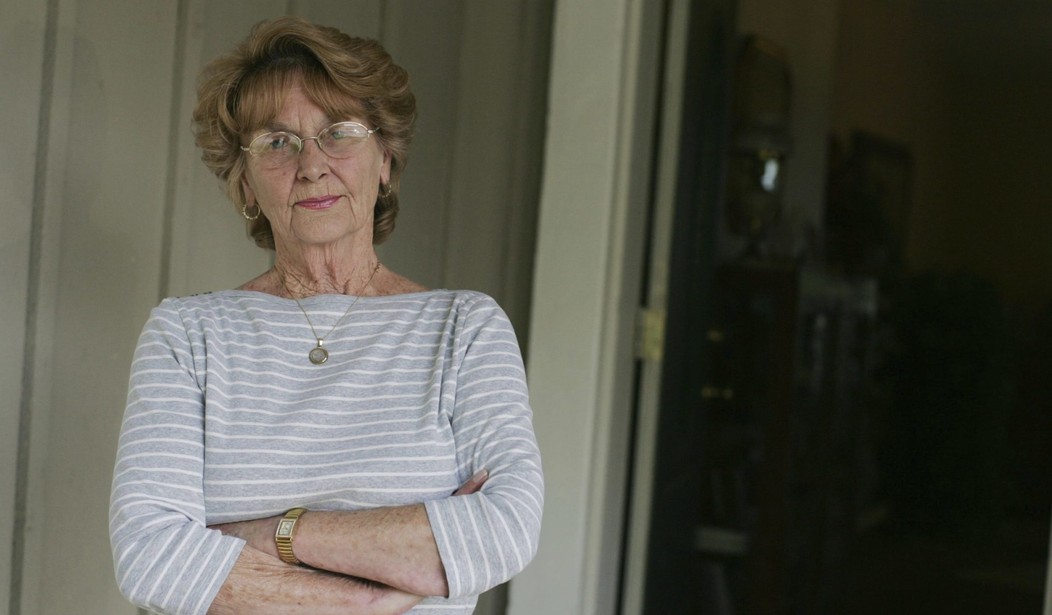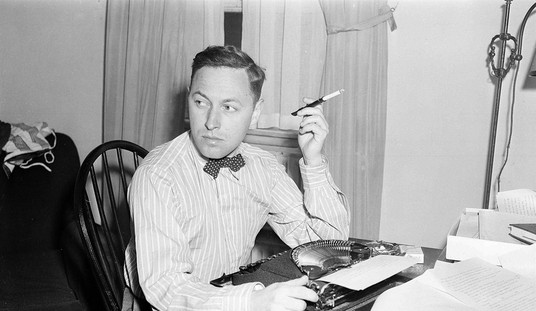A NASA investigator is competing with United Airlines for “Villain of the Week” after terrifying a 74-year-old grandmother during an overwrought sting operation, causing her to urinate on herself.
The incident happened a few years ago, but the infuriating story is resurfacing now because the U.S. Court of Appeals for the Ninth Circuit just ruled in the victim’s favor in her lawsuit.
Joann Davis, “a financially distressed widow of an engineer on the Apollo program,” was only trying to raise money to pay for her sick son’s surgeries by selling a tiny moon rock and “a small piece of the Apollo 11 heat shield” that her now deceased husband had left her. According to “family lore,” Neil Armstrong had given the paperweights to Davis “in recognition of his service to NASA.”
Joann wasn’t trying to get away with anything illegal. She actually contacted NASA, naively asking them if they could help her find a buyer for what she described as “2 rare Apollo 11 space artifacts.”
“I’ve been searching the internet for months attempting to find a buyer,” Davis wrote. “If you have any thoughts as to how I can proceed with the sale of these two items, please call.”
Rather than help her, the office of NASA’s Inspector General at the Kennedy Space Center in Florida set out to bust her in the great G-Ma Moon Rock Caper of 2011.
There, an agent smelled a crime. Perhaps, he thought, she was trying to unload purloined government property, a crime.
The IG’s office launched an investigation, getting a “confidential source” to call Davis pretending to be a broker. He called himself “Jeff.” Jeff pretended to have previously worked at NASA and promised to help her sell the paperweights.
The two exchanged seven phone calls, during which Davis expressed concern that NASA would confiscate the paperweights unless she could prove they were a gift. She explained, according to court documents, that she wanted “to do things legally” because she was “just not an illegal person.”
Jeff said he was a legal person too, but reminded her that the sale of a moon rock “can’t be done publicly.”
Davis agreed to sell the sample to NASA for $1.7 million, saying “she wanted to leave her three children an inheritance and take care of her sick son.”
After the phone calls, Norman Conley, a criminal investigator in the IG’s office, obtained a warrant stating that Davis was “in possession of contraband.”
They then planned a sting operation on the 74-year-old woman.
Jeff arranged to meet with Davis on May 19, 2011, at a Denny’s Restaurant in Lake Elsinore, Calif., for purposes, she was led to believe, of finalizing the sale of the paperweights.
Davis went with her second husband, Paul Cilley.
Greeting Davis, who is 4-foot-11, were three armed federal agents, with three Riverside County Sheriff’s officials present but not visible, apparently as backup.
The court opinion described what happened next:
Davis placed the paperweights on the table. Jeff said he thought the heat shield was worth about $2,000. Shortly thereafter, Conley announced himself as a “special agent,” and another officer’s hand reached over Davis, grabbed her hand, and took the moon rock paperweight. Simultaneously, a different officer grabbed Cilley by the back of the neck and restrained him by holding his arm behind his back in a bent-over position. Then, an officer grabbed Davis by the arm, pulling her from the booth. At this time, Davis claims that she felt like she was beginning to lose control of her bladder. One of the officers took her purse … Four officers escorted them to the restaurant parking lot for questioning after patting them down to ensure that neither was armed.
She kept telling the officers she needed to use the bathroom. Undeterred, they continued walking her to the parking lot for interrogation, however, the court said. She then “urinated in her clothing.”
She was soaked in urine, visibly, the court said. Still, they continued interrogating her in the restaurant parking lot for between an hour and a half and two hours. They read her Miranda rights, ultimately allowed her to leave and referred the case to the U.S. attorney in Orlando.
There never was a crime, of course. She didn’t steal the artifacts. Ultimately, the investigation was closed when the prosecutor in Orlando declined to bring a case.
In 2013, Davis and Cilley sued the government and Conley, seeking damages for a violation of their constitutional rights. Conley claimed “qualified immunity” from the suit, legally available to federal agents unless they violate “clearly established” constitutional rights, in this case, Davis’s Fourth Amendment right against unreasonable search and seizure. A district court rejected the claim and he appealed.
Here is Agent Conley’s lawyer, two months ago in Pasadena, appealing the denial of qualified immunity in an action alleging wrongful detention.
The appeals court ruled against Conley on Thursday. “He might be entitled to qualified immunity, had his actions been reasonable,” wrote Chief Judge Sidney Thomas.
Joseph Gutheinz, a University of Phoenix instructor and former NASA investigator, told the AP in 2011 that he couldn’t blame Davis because NASA done such a poor job safekeeping its lunar materials. Gutheinz has spent years tracking down missing moon rocks.
About 2,200 samples of lunar rocks, core samples, pebbles, sand and dust — weighing about 840 pounds — were brought to Earth by NASA’s Apollo lunar landing missions from 1969 to 1972. A recent count showed 10 states and more than 90 countries could not account for their shares of the gray rocks.
While bigger rocks, such as those given to various countries and museums were carefully inventoried and tracked, it now appears there are unknown numbers of much smaller pieces circulating in the public. Some of these may have been turned into paperweights and informally given away by NASA engineers.
“I have a real moral problem with what’s happened here in California,” Gutheinz said. “I’ve always taken the position that no one should own an Apollo-era moon rock. They belong to the people. But if we did such a poor job of safeguarding (lunar samples,) I cannot fault that person.”









Join the conversation as a VIP Member